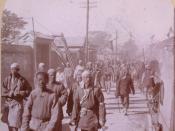How did imperialism affect China? Imperialism had a major affect on China. The Opium War played a major part of this. The opium war was provoked by the problems with European countries and China. British were getting tired of doing outside trading and wanted to trade directly with China. China had little need from the West. As a direct result the smuggling of opium began. Opium was forbidden in China except for medicinal use. The war was fought to determine the relations between China and the West, and as a result China was forced to reevaluate her position as the center of the world. The treaty of Nanking ended the first Opium war. As a result to China's distant methods of trade, there were two rebellion periods, the taiping rebellion and the boxer rebellion. The taiping revolt was a radical political and religious uprising. The rebels rose against the tyranny of the Manchus, supporting a program partly based on Christian doctrines.
The Boxer Rebellion was a peasant uprising that attempted to drive all foreigners from China and to destroy the Mongol Ch'ing dynasty. After Japan defeated China in 1895, Japan and the Western Powers began to control more and more of the Chinese economy. In reaction the Boxer movement attracted popular support. In 1900 the Dowager Empress persuaded the Boxers to drop their opposition to the Ch'ing dynasty and unite with it to destroy the foreigners. China Missionaries and other foreigners were killed by them. By 1901 an agreement was signed on China by Western powers



Alright for starters.
This could turn into a good essay, but needs to expand on everything that has been stated here. A bit of expanding and this would be a great historical essay.
3 out of 3 people found this comment useful.